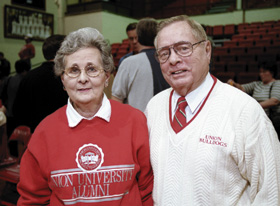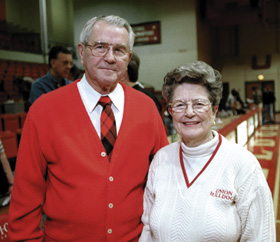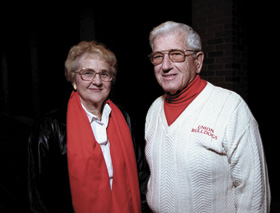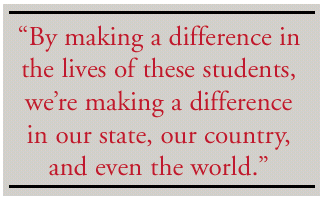|
You see them everyday on campus, in the halls or even in the cafeteria. Though you may not find them in the classrooms, you can be sure to find these good-natured Union helpers stuffing envelopes over in Hammons Hall for the Alumni office, or working the concession stand at a Bulldogs game. They’re Union volunteers – a much needed and essential part of the Union family.
Despite the fact that, with the exception of the Hundleys, the couples have spent the majority of their years away from Jackson, they have returned to the area and to their alma mater since retiring. “When we we re nearing retirement, we wondered where we would want to spend it,” says Christine Fairless, who was a teacher and followed her husband, Mark, all over the world with his job as a military chaplain. “We decided that if we came back here to this area, not only would there be family nearby, but there would be Union. There would always be something to do. We could go see plays and concerts and maybe we could get involved and even reacquainted with old friends, and that’s just what has happened. It’s really been fun,” says Fairless. “Mary Ruth was saying just the other day how fun it is to be around the “By the staff and students at Union,” says her husband Bob Hundley. “Everyone is just as nice as they can be, and they really treat us like we’re part of the family.” It’s that family relationship that Virginia Dickinson says separates Union from other schools and is what keeps Union alumni coming back. “I think all of us have always felt close to Union, even from the very beginning, after we graduated,” says the retired home economics teacher. “Some people don’t (feel close) at first and come back years later, but somehow we just always had that feeling of extended family. Even though we lived far away, we still kept in touch,” says Dickinson. Remembering The Way It Was “Dress requirements and styles were a lot different then, compared to today, ” says Hundley, shaking her head with a laugh. Her husband agrees. “You weren’t allowed to go play pool anywhere – now they have pool tables in the student lounge,” adds Bob. Although tuition is higher than during their student days, Union continues to make extraordinary efforts to provide as much scholarship support to students as possible. Growing up during the Depression , Union’s tuition was only $200 a quarter, though 25 cents an hour was the average wage. Scholarships were only given to football and basketball athletes. “When I look back and think about the fact that I went to Memphis State my first year on a scholarship, and to think that my daddy insisted that I come here to Union with no scholarship and knowing that he wasn’t the type of man to waste money – I think that spoke very clearly for him and how strongly he felt I needed to be at Union,” says Dickinson. “We always thought – we’ve got to work hard, because we can’t let daddy waste that money,” adds Christine Fairless. Chapel was also different. Though the format was relatively similar, with music and a devotional, students then we re assigned seats and their attendance was checked off at each chapel service. Bob and Mary Ruth Hundley recently attended a chapel service and were amazed at the attendance. “Todd Brady, the campus minister was speaking, and we couldn’t get over that it was voluntary and the chapel was full,” says Mary Ruth. “We asked some students if they were assigned seats. We were afraid we’d get someone’s seat,” explains Bob. “They didn’t know what we were talking about.” While many things have changed about Union’s campus overall, these volunteers say that the close ties formed here at Union – due partly to small classes and personal interest from teachers – is what makes being a Union graduate special. “I think we have an element of pride in the development of Union in the years that we’ve been away, and it’s been great to come back and see the new campus and all of the positive activity that’s occurring,” says Mark Fairless. “It makes me feel like the dollars that are given to Union are extremely well-invested.” Giving Back
Bob Hundley agrees but says there are other ways to support the university if giving of your time is not an option. “Send some money,” says Hundley, who adds that any amount will help. “A lot of corporations give money to Union based on the number of alumni that have given. So for that reason, I say send any amount – it’s going to make a difference.” “It’s really important that we support institutions like Union who offer not only an excellence in education, but a commitment to moral values,” adds Mark Fairless. “By making a difference in the lives of these students, we’re making a difference in our state, our country, and even the world.” |





 “I think there’s a period in your life when you are so
busy with little children and getting settled into family life, that your
alma mater isn’t a top priority,” says Virginia Dickinson. “But as
you mature and life begins to fall into place, then you begin to realize
– this is where I came from and where I want my children or other young
people to have an opportunity to go. Your values change – you realize
that largely, who you are is because of the years you spent on this
campus,” explains Dickinson.
“I think there’s a period in your life when you are so
busy with little children and getting settled into family life, that your
alma mater isn’t a top priority,” says Virginia Dickinson. “But as
you mature and life begins to fall into place, then you begin to realize
– this is where I came from and where I want my children or other young
people to have an opportunity to go. Your values change – you realize
that largely, who you are is because of the years you spent on this
campus,” explains Dickinson.